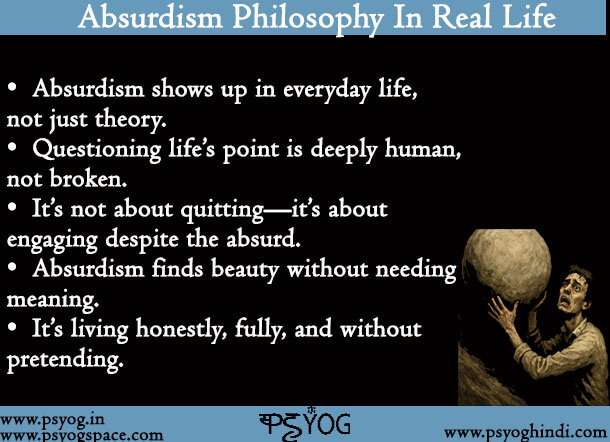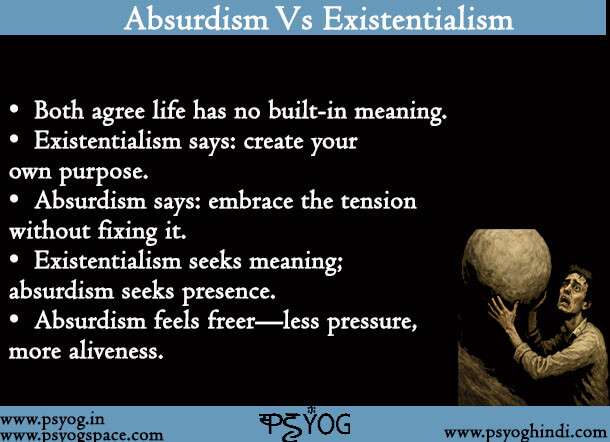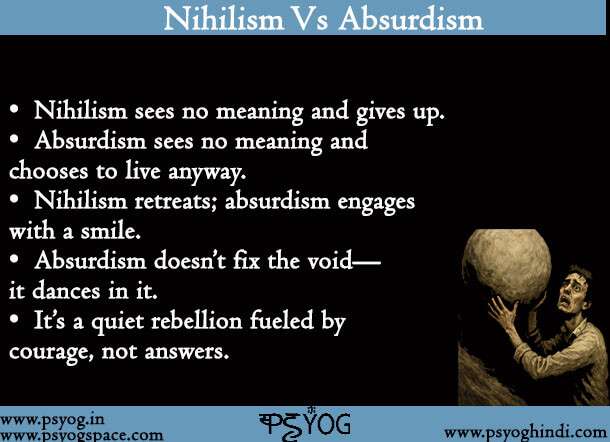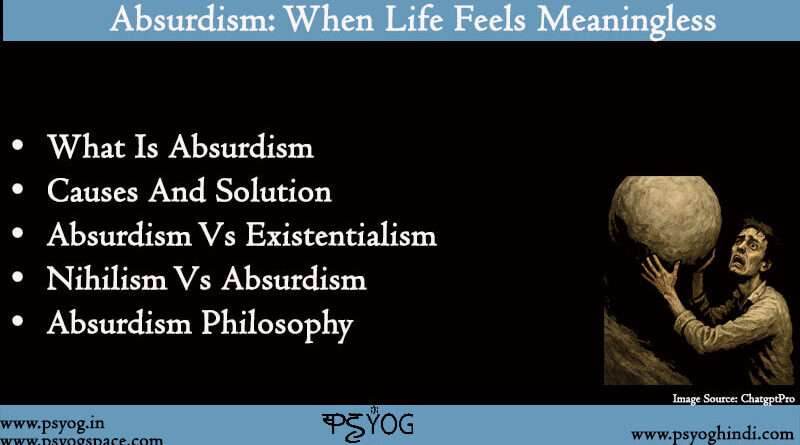Absurdism: What Is Absurdism, Absurdism Vs Existentialism, Nihilism Vs Absurdism, Absurdism Philosophy
As we are all aware of this, there is a time in life when silence speaks louder than words. Imagine yourself sitting, looking at everything you’ve built, your job, your relationships, your goals. A the surface level, it seems like an accomplishment, but deep down inside, you will hollow and empty. Not because it’s bad, but because something deeper is missing. That crack in the surface is where absurdism begins to take root. The question, “Why am I doing all this?” keeps echoing. This isn’t about sadness or failure—it’s about truth. In trying to live a meaningful life, we run into the absurd fact that the universe offers none. That contradiction is the heart of what is absurdism. And once you face it, the mind naturally drifts toward comparisons: absurdism vs existentialism, or even nihilism vs absurdism. But unlike those paths, the absurdism philosophy doesn’t seek to fix the void. It learns how to dance in it.
What Is Absurdism?
So, really—what is absurdism? It’s not just a philosophy tucked in old books. Rather, it’s a strange feeling which no one can ignore for long. Have you ever found yourself chasing a dream, realizing it, and then wondering that why it did not give you lasting happiness? That’s not failure. That’s the absurd.
Absurdism is the understanding that humans are meaning-seeking creatures in a world that offers no meaning back. We want answers. The universe gives us silence. And that mismatch? That’s the absurd condition. But here’s the twist: absurdism doesn’t ask you to fix it. It asks you to live with it.
To someone unfamiliar, what is absurdism might sound cynical. But it’s not. It’s honest. It’s the bold refusal to lie to yourself. Most people keep running from this truth—burying themselves in distractions or routines. Absurdism asks us to stop running. To look life in the eye and say, “Fine, you don’t make sense. I’ll live fully anyway.” (Read: Everything about Nihilism)

Absurdism Philosophy In Real Life
The beauty of absurdism philosophy is that it’s not trapped in intellectual talk. It plays out in the mess of real life. We all wake up, make a living, and do everything that we are expected to. However, despite doing it all, there’s a voice in your head whispering, “What’s the point of all this?” That question doesn’t make you broken. It makes you human.
Here’s where absurdism differs from just being numb. You don’t deny that life feels strange or repetitive. You accept it—and still engage. The absurdism philosophy isn’t about quitting life; it’s about showing up, even when the rules don’t make sense. It’s about planting flowers in a desert because, why not? Beauty doesn’t need permission.
And in that shift—when you stop looking for grand meaning and just experience—you start living more honestly. You laugh harder. You cry deeper. You stop pretending. That’s not giving up; that’s showing up in a different way.

Absurdism Vs Existentialism
Now let’s get into the heart of the comparison: absurdism vs existentialism. Both start from the same place: life has no inherent meaning. But they go different ways from there.
Existentialism says, “Okay, I’ll create my own meaning.” It’s about choosing your values and living by them, even in the face of cosmic silence. Absurdism, on the other hand, says, “I don’t need to create anything. I’ll just live in the tension.” It’s the space between meaning and meaninglessness. It doesn’t try to resolve the contradiction—it embraces it. (Read: Existentialism, why do we feel it?)
In the debate of absurdism vs existentialism, neither side is wrong. They’re just different ways of coping. Existentialism puts responsibility in your hands—live with purpose, even if it’s self-made. Absurdism doesn’t need purpose. It needs presence.
Absurdism can feel more freeing. It removes the pressure to “build a meaningful life” and replaces it with the permission to feel life, even if it’s chaotic. It’s not about constructing significance—it’s about dancing with insignificance.

Nihilism Vs Absurdism
So what about nihilism vs absurdism? This one’s powerful—because both can feel like heavy emotional places. But again, they differ in response.
Nihilism sees that life has no meaning and collapses. It says, “Nothing matters, so why bother?” It retreats. It turns off. It walks away. Absurdism sees the same truth—but instead of falling into despair, it smiles. It says, “Nothing matters? Great. That means I’m free.”
This is the core of the nihilism vs absurdism divide. One leads to silence; the other, to song. One walks out of the theatre; the other watches the absurd play until the final act, popcorn in hand.
Absurdism doesn’t fix the void. It doesn’t even try. It just refuses to be crushed by it. It lives in defiance of despair—not through answers, but through courage. And that makes it one of the most quietly heroic philosophies out there.

Conclusion
So, like many of us, if you’ve ever felt like the world was speaking a language you didn’t understand, there are chances that you were experiencing absurdism. And that’s okay. The modern world pushes us to find meaning fast—to hustle, grind, win. But what happens when all that chasing feels hollow? You slow down. You reflect. You question. You face the absurd.
That’s when you begin to ask: what is absurdism, really? It’s the space between craving answers and accepting that there might not be any. It’s not a flaw—it’s a freedom. And it’s not isolated—it’s everywhere. In work, in love, in art, in silence. (Read: How to experience God?)
The discussion of absurdism vs existentialism helps us see different paths. One builds meaning, the other walks without it. Both are valid. In the same way, the contrast between nihilism vs absurdism reminds us we have choices. One path gives up. The other finds joy despite everything.
And if you dig into the absurdism philosophy deeply enough, you’ll see that it isn’t about despair. It’s about release. It lets you breathe. It lets you stop chasing and start being. It says: “You don’t have to solve life. You just have to live it—with eyes open.”
FAQs
What are the key differences between existentialism and absurdism?
There is one thing in common between existentialism and absurdism. That thing is, they both feel that life is meaningless, however, they differ at another level. Existentialism says that “if life has no meaning, then we should create one,” while absurdism says that “life has no meaning, I do not care.”In short, we can say that existentialism builds and absurdism lets go.
What is the concept of absurdism?
Absurdism is a state wherein people feel as if there is no meaning in life. However, despite them feeling this way, they embrace and live life, but without doing much to find any meaning. Hence they feel that life is “absurd,” because it is meaningless, but still they are living it.



